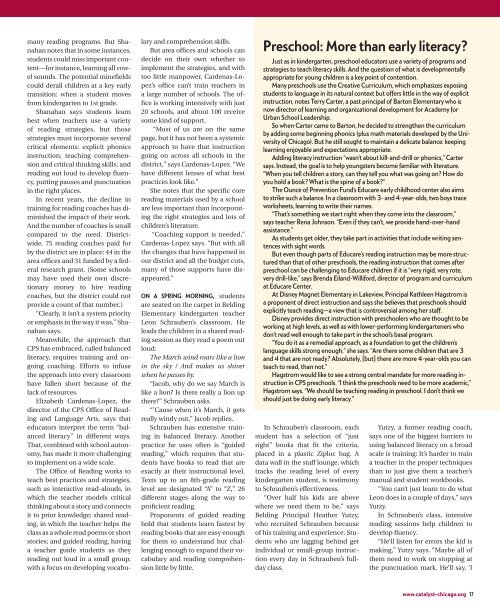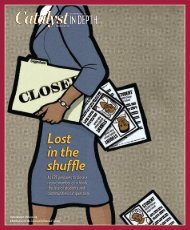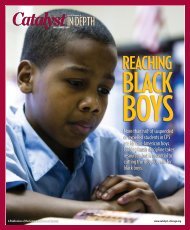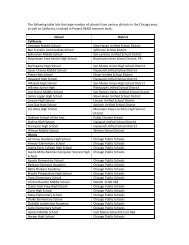The ABCs of kindergarten - catalyst-chicago.org
The ABCs of kindergarten - catalyst-chicago.org
The ABCs of kindergarten - catalyst-chicago.org
You also want an ePaper? Increase the reach of your titles
YUMPU automatically turns print PDFs into web optimized ePapers that Google loves.
many reading programs. But Shanahan<br />
notes that in some instances,<br />
students could miss important content—for<br />
instance, learning all vowel<br />
sounds. <strong>The</strong> potential minefields<br />
could derail children at a key early<br />
transition: when a student moves<br />
from <strong>kindergarten</strong> to 1st grade.<br />
Shanahan says students learn<br />
best when teachers use a variety<br />
<strong>of</strong> reading strategies, but those<br />
strategies must incorporate several<br />
critical elements: explicit phonics<br />
instruction; teaching comprehension<br />
and critical thinking skills; and<br />
reading out loud to develop fluency,<br />
putting pauses and punctuation<br />
in the right places.<br />
In recent years, the decline in<br />
training for reading coaches has diminished<br />
the impact <strong>of</strong> their work.<br />
And the number <strong>of</strong> coaches is small<br />
compared to the need. Districtwide,<br />
75 reading coaches paid for<br />
by the district are in place: 44 in the<br />
area <strong>of</strong>fices and 31 funded by a federal<br />
research grant. (Some schools<br />
may have used their own discretionary<br />
money to hire reading<br />
coaches, but the district could not<br />
provide a count <strong>of</strong> that number.)<br />
“Clearly, it isn’t a system priority<br />
or emphasis in the way it was,” Shanahan<br />
says.<br />
Meanwhile, the approach that<br />
CPS has embraced, called balanced<br />
literacy, requires training and ongoing<br />
coaching. Efforts to infuse<br />
the approach into every classroom<br />
have fallen short because <strong>of</strong> the<br />
lack <strong>of</strong> resources.<br />
Elizabeth Cardenas-Lopez, the<br />
director <strong>of</strong> the CPS Office <strong>of</strong> Reading<br />
and Language Arts, says that<br />
educators interpret the term “balanced<br />
literacy” in different ways.<br />
That, combined with school autonomy,<br />
has made it more challenging<br />
to implement on a wide scale.<br />
<strong>The</strong> Office <strong>of</strong> Reading works to<br />
teach best practices and strategies,<br />
such as interactive read-alouds, in<br />
which the teacher models critical<br />
thinking about a story and connects<br />
it to prior knowledge; shared reading,<br />
in which the teacher helps the<br />
class as a whole read poems or short<br />
stories; and guided reading, having<br />
a teacher guide students as they<br />
reading out loud in a small group,<br />
with a focus on developing vocabulary<br />
and comprehension skills.<br />
But area <strong>of</strong>fices and schools can<br />
decide on their own whether to<br />
implement the strategies, and with<br />
too little manpower, Cardenas-Lopez’s<br />
<strong>of</strong>fice can’t train teachers in<br />
a large number <strong>of</strong> schools. <strong>The</strong> <strong>of</strong>fice<br />
is working intensively with just<br />
20 schools, and about 100 receive<br />
some kind <strong>of</strong> support.<br />
“Most <strong>of</strong> us are on the same<br />
page, but it has not been a systemic<br />
approach to have that instruction<br />
going on across all schools in the<br />
district,” says Cardenas-Lopez. “We<br />
have different lenses <strong>of</strong> what best<br />
practices look like.”<br />
She notes that the specific core<br />
reading materials used by a school<br />
are less important than incorporating<br />
the right strategies and lots <strong>of</strong><br />
children’s literature.<br />
“Coaching support is needed,”<br />
Cardenas-Lopez says. “But with all<br />
the changes that have happened in<br />
our district and all the budget cuts,<br />
many <strong>of</strong> those supports have disappeared.”<br />
On a spring morning, students<br />
are seated on the carpet in Belding<br />
Elementary <strong>kindergarten</strong> teacher<br />
Leon Schrauben’s classroom. He<br />
leads the children in a shared reading<br />
session as they read a poem out<br />
loud:<br />
<strong>The</strong> March wind roars like a lion<br />
in the sky / And makes us shiver<br />
when he passes by.<br />
“Jacob, why do we say March is<br />
like a lion? Is there really a lion up<br />
there?” Schrauben asks.<br />
“’Cause when it’s March, it gets<br />
really windy out,” Jacob replies.<br />
Schrauben has extensive training<br />
in balanced literacy. Another<br />
practice he uses <strong>of</strong>ten is “guided<br />
reading,” which requires that students<br />
have books to read that are<br />
exactly at their instructional level.<br />
Texts up to an 8th-grade reading<br />
level are designated “A” to “Z,” 26<br />
different stages along the way to<br />
pr<strong>of</strong>icient reading.<br />
Proponents <strong>of</strong> guided reading<br />
hold that students learn fastest by<br />
reading books that are easy enough<br />
for them to understand but challenging<br />
enough to expand their vocabulary<br />
and reading comprehension<br />
little by little.<br />
Preschool: More than early literacy?<br />
Just as in <strong>kindergarten</strong>, preschool educators use a variety <strong>of</strong> programs and<br />
strategies to teach literacy skills. And the question <strong>of</strong> what is developmentally<br />
appropriate for young children is a key point <strong>of</strong> contention.<br />
Many preschools use the Creative Curriculum, which emphasizes exposing<br />
students to language in its natural context but <strong>of</strong>fers little in the way <strong>of</strong> explicit<br />
instruction, notes Terry Carter, a past principal <strong>of</strong> Barton Elementary who is<br />
now director <strong>of</strong> learning and <strong>org</strong>anizational development for Academy for<br />
Urban School Leadership.<br />
So when Carter came to Barton, he decided to strengthen the curriculum<br />
by adding some beginning phonics (plus math materials developed by the University<br />
<strong>of</strong> Chicago). But he still sought to maintain a delicate balance: keeping<br />
learning enjoyable and expectations appropriate.<br />
Adding literacy instruction “wasn’t about kill-and-drill or phonics,” Carter<br />
says. Instead, the goal is to help youngsters become familiar with literature.<br />
“When you tell children a story, can they tell you what was going on? How do<br />
you hold a book? What is the spine <strong>of</strong> a book?”<br />
<strong>The</strong> Ounce <strong>of</strong> Prevention Fund’s Educare early childhood center also aims<br />
to strike such a balance. In a classroom with 3- and 4-year-olds, two boys trace<br />
worksheets, learning to write their names.<br />
“That’s something we start right when they come into the classroom,”<br />
says teacher Rena Johnson. “Even if they can’t, we provide hand-over-hand<br />
assistance.”<br />
As students get older, they take part in activities that include writing sentences<br />
with sight words.<br />
But even though parts <strong>of</strong> Educare’s reading instruction may be more structured<br />
than that <strong>of</strong> other preschools, the reading instruction that comes after<br />
preschool can be challenging to Educare children if it is “very rigid, very rote,<br />
very drill-like,” says Brenda Eiland-Williford, director <strong>of</strong> program and curriculum<br />
at Educare Center.<br />
At Disney Magnet Elementary in Lakeview, Principal Kathleen Hagstrom is<br />
a proponent <strong>of</strong> direct instruction and says she believes that preschools should<br />
explicitly teach reading—a view that is controversial among her staff.<br />
Disney provides direct instruction with preschoolers who are thought to be<br />
working at high levels, as well as with lower-performing <strong>kindergarten</strong>ers who<br />
don’t read well enough to take part in the school’s basal program.<br />
“You do it as a remedial approach, as a foundation to get the children’s<br />
language skills strong enough,” she says. “Are there some children that are 3<br />
and 4 that are not ready? Absolutely, [but] there are more 4-year-olds you can<br />
teach to read, than not.”<br />
Hagstrom would like to see a strong central mandate for more reading instruction<br />
in CPS preschools. “I think the preschools need to be more academic,”<br />
Hagstrom says. “We should be teaching reading in preschool. I don’t think we<br />
should just be doing early literacy.”<br />
In Schrauben’s classroom, each<br />
student has a selection <strong>of</strong> “just<br />
right” books that fit the criteria,<br />
placed in a plastic Ziploc bag. A<br />
data wall in the staff lounge, which<br />
tracks the reading level <strong>of</strong> every<br />
<strong>kindergarten</strong> student, is testimony<br />
to Schrauben’s effectiveness.<br />
“Over half his kids are above<br />
where we need them to be,” says<br />
Belding Principal Heather Yutzy,<br />
who recruited Schrauben because<br />
<strong>of</strong> his training and experience. Students<br />
who are lagging behind get<br />
individual or small-group instruction<br />
every day in Schrauben’s fullday<br />
class.<br />
Yutzy, a former reading coach,<br />
says one <strong>of</strong> the biggest barriers to<br />
using balanced literacy on a broad<br />
scale is training: It’s harder to train<br />
a teacher in the proper techniques<br />
than to just give them a teacher’s<br />
manual and student workbooks.<br />
“You can’t just learn to do what<br />
Leon does in a couple <strong>of</strong> days,” says<br />
Yutzy.<br />
In Schrauben’s class, intensive<br />
reading sessions help children to<br />
develop fluency.<br />
“He’ll listen for errors the kid is<br />
making,” Yutzy says. “Maybe all <strong>of</strong><br />
them need to work on stopping at<br />
the punctuation mark. He’ll say, ‘I<br />
www.<strong>catalyst</strong>-<strong>chicago</strong>.<strong>org</strong> 17









